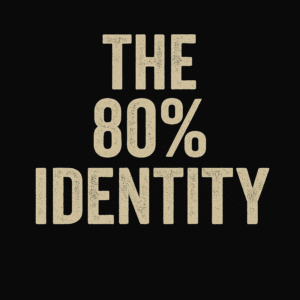I don’t aim for perfection. I aim for 80%.
And I hold that 80% with a level of discipline most people don’t understand.
My fault—if you can call it that—is that I believe in mastering most skills at about 80%, much like Patagonia’s founder, Yvon Chouinard. I’ve never read his book, but I’ve always respected the idea that 80% mastery is the sweet spot for most things in life.
For me, that 80% is about standards—and that’s where discipline comes in.
Throughout life, many have called my approach “extreme,” “too much,” or “obsessive.”
I describe it more like this:
“Once I lock onto something, I don’t let go until I’ve got a grip on it.”
That’s excessive for most people.
So be it.
Where I Started
“Back in the day,” I thought discipline looked like the first half of Full Metal Jacket—that Marine-type rigidity: everything was squared away, organized, and precise.
But that definition changed when I was 17.
One day, I woke up, put on my New Balance sneakers, and went for a run. I’ve never stopped.
I don’t know what happened to me that morning, but I remember it vividly. Something clicked, and I knew running was what I was meant to do. It became an obsession—27+ years later, it still is.
The idea was simple: do something hard and stick with it, not because anyone else notices, but because you know it matters. Because this “thing,” whatever it is, is what gets you from one point in your life to the next.
What Most People Get Wrong
Most people misunderstand discipline.
They read Jocko Willink, follow Cameron Hanes, and others who speak about it—and while the message is solid, most still miss the point.
It’s not about being rigid, obsessed, or controlled.
It’s about having standards for yourself and living up to them.
Once you gain mastery over those standards, you impose new ones.
And then you chase those.
It never ends—because the standards are there to make you better.
And hopefully, that resonates outward: your family, your team, your company.
Let me be clear: I’m not trying to put a new spin on discipline.
I’m just saying that beyond being a lifestyle—and that’s what it is—it’s something deeply personal. You have to figure it out for yourself in a way that enhances your identity.
The people who speak about discipline do a fantastic job of inspiring others and showing what works for them. But beneath all the routines, all the structure, what you’ll always find is one common thread:
Standards.
And those are unique to each person.
The 80% Identity
I aim for 80% mastery before moving on.
Going beyond that is for specialists—and I have friends for that.
But that 80% becomes part of the practice—part of the daily grind—until it isn’t.
You hold it until it’s no longer needed, or until it becomes the foundation for the next thing.
So…
- Yes, you must be relentless.
- Yes, it takes character.
- Yes, no one really cares.
- And yes, very few will ever notice—if they do at all.
But those who get it? They always notice.
You’ll likely have very few friends, but the ones you do have share the same mindset.
Trust me—they are few and far between.
It’s a lifestyle based on standards.
And yes, at some point, you have to make those standards your own.
Fit them to your life. Use them to move forward.
So There It Is
That’s my take:
Strive for 80% mastery.
Maintain high standards.
Do it because no one’s watching and no one cares.
Will it make you rich or ultra-successful?
Not necessarily.
Will it give you meaning and fulfillment because you’re working on yourself, for yourself?
Yes.

